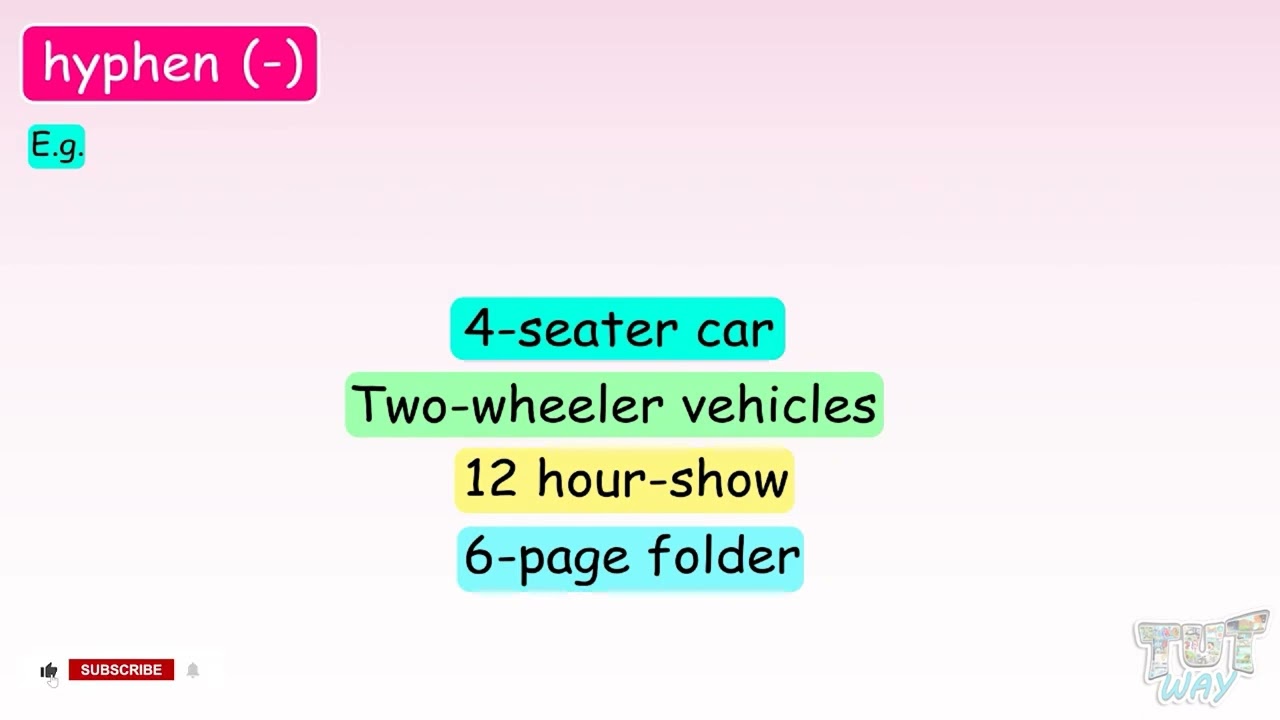How To Use Hyphens | Usage Of Hyphen(-) | Punctuation Marks | Dashes | English Grammar
Unleash Your Creative Genius with MuseMind: Your AI-Powered Content Creation Copilot. Try now! 🚀
Introduction
Hyphens. The small but mighty symbol that joins words together. If you've ever wondered about the proper usage of hyphens, you're in the right place. In this article, we'll delve into the world of hyphens and discover their importance in creating clarity and adding a touch of creativity to our writing. So, let's hop on board the hyphen train and embark on this linguistic adventure!
The Glue That Holds Words Together
Have you ever come across phrases like "non-serious candidates" or "never-to-be-forgotten lessons"? The hyphen in these phrases serves a specific purpose - it joins two or more elements to create a collective word that describes a noun. It's like the invisible glue that holds these words together, enhancing their meaning and impact. So, next time you come across a phrase that seems like a combination of words with a common meaning, embrace the power of the hyphen!
Avoiding Ambiguity with Hyphens
Imagine a world without hyphens. A world where phrases like "single-sided tape" or "double-minded attitude" lack the crucial connection between their words. Without the hyphen, these phrases become open to interpretation, leading to ambiguity and confusion. Is it a tape with a single side or a tape that is single and sided? Is it an attitude that is double-minded or a double attitude focused on the mind? The answer lies in the hyphen. By gluing together words that are meant to be read and understood as one unit, the hyphen eliminates any room for misinterpretation.
Exploring the Possibilities of Hyphenated Words
Hyphenated words open the door to a world of exciting linguistic possibilities. From "four-seater car" to "two-wheeler vehicle," hyphens give us the ability to seamlessly combine words to create unique and descriptive terms. So, the next time you're feeling adventurous, why not create your own hyphenated word? How about a "six-page folder" or a "twelve-hour show"? Let your imagination run wild and let the hyphen be your guide!
Hyphens and Age: A Love Story
When it comes to expressing age, hyphens come to the rescue. Take the phrase "a three-year-old child," for example. The hyphens in this sentence play a vital role in connecting the words "three," "year," and "old" into a cohesive unit that acts as a collective adjective for the noun "child." Without the hyphens, the phrase loses its clarity and may be misinterpreted. So, the next time you want to express someone's age, remember the power of the hyphen!
The Numbers Game: Hyphens from 21 to 99
Have you ever wondered why numbers from 21 to 99 are written with hyphens? It's a clever way to maintain consistency and clarity in written communication. By using hyphens, we separate the tens and units digits, making it easier for readers to comprehend the number. So, whether it's "thirty-four" or "sixty-seven," let the hyphen be your trusty companion in the world of numbers!
Fractions and Hyphens: A Perfect Blend
Fractions can be tricky to write, but fear not - the hyphen is here to help! When writing fractions like "one-fourth" or "one-third," the hyphen acts as a bridge between the numerator and denominator, ensuring a smooth reading experience. However, when fractions are preceded by articles like "a" or "an," such as in "more than a half," the hyphens are not necessary. So, next time you're expressing portions or fractions, remember the hyphen's ability to simplify and clarify your message.
Adding Flair to Single Letters
Sometimes, a single letter can do wonders when combined with a word. Take "x-ray," for example. The hyphen connects the letter "x" with "ray," creating a powerful visual representation of the letter's purpose. From "B-grade" to "L-shaped," hyphenated words bring flair and creativity to our language. So, embrace the hyphen and let it be your ally in the quest for linguistic expression!
Prefixes and Suffixes: To Hyphenate or Not to Hyphenate?
When it comes to prefixes and suffixes, the use of hyphens can vary. While some prefixes and suffixes require a hyphen for clarity, others can do without it. Take the examples of "mid-1980s" or "pre-wedding shoot." The hyphens in these words remove any ambiguity and ensure that the meaning is conveyed clearly. However, words like "Parenthood" or "helpless" don't require hyphens. So, keep in mind that the use of hyphens with prefixes and suffixes is not always mandatory, but it can add that extra touch of clarity and creativity!
The Hyphen's Role in Family Relations
In the realm of family relations, hyphens play a significant role in expressing connections and relationships. From "brother-in-law" to "stepmother," hyphens help us convey the bonds we share with our loved ones. However, not all family relations require hyphens. Words like "grandparents" or "grandson" can be written without hyphens, as their meaning is clear and unambiguous. So, when it comes to writing about family, choose the hyphen to enhance your words and express the connections that are dear to your heart.
Conclusion
Congratulations! You've successfully navigated the intricate world of hyphens. From joining words together to eliminating ambiguity and adding a touch of creativity, the hyphen has proven to be a valuable linguistic tool. So, go forth and embrace the power of the hyphen in your writing. Let it be the glue that holds your words together, creating clarity, and adding a dash of flair. Remember, the hyphen is not just a symbol; it's a tool that unlocks the true potential of our language. Happy hyphenating!
References:
